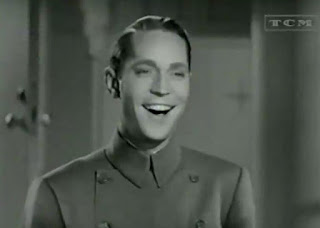Friday, June 24, 2016
The Girl Downstairs (1938)
The Girl Downstairs is a 1938 romantic comedy directed by Norman Taurog, who also directed Boys Town, Broadway Melody of 1940, Room for One More, and many Elvis movies. The film pairs Franchot with Franciska Gaal, a Budapest-born actress who starred in a handful of American films before returning to her homeland in 1940. It also features a great supporting cast including Walter Connolly, Reginald Gardiner, Rita Johnson, and Billy Gilbert.
Remember when Cary Grant sings the line "must you be so darn delightful?" to Deborah Kerr as they dance together on their last night of the cruise in An Affair to Remember? I could definitely direct that line to The Girl Downstairs! It's a shame that it doesn't get more exposure, because the film is really "so darn delightful"!
Franchot Tone is Paul Wagner, a wealthy playboy wooing Rosalind Brown (Rita Johnson). Feeling drunk and amorous, Paul shows up uninvited to Rosalind's house. Rosalind likes Paul in return, but her father (Walter Connolly) loathes him. Mr. Brown assembles all of the family's servants to get a good look at Paul, before he instructs them to bar him access to the house. One servant, scullery maid Katerina (Franciska Gaal), is not present. Knowing that she has no way of recognizing him, Paul schemes to use Katerina to gain access to the house. Katerina, a sweet, lonely girl from the old country, is attracted to Paul, disguised in his chauffer's uniform, at once. When Paul makes a date with her for an upcoming carnival, the sheltered Katerina is delighted. Paul's plan is to take Katerina home as soon as possible in order to sneak into the Brown's house to see Rosalind. Katerina, however, takes her time at the carnival, enjoying each ride and game. In the car ride home, Katerina is worried about Paul using his employer's car to take her out (remember she thinks he is a servant as well), but quickly drops the subject when Paul kisses her on the cheek.
Paul is amused by Katerina's sweetness, but still has his heart set on the glamorous Rosalind. When Rosalind send her scullery maid to Paul's house, Paul answers the door in his regular clothes. Thinking on his feet, Paul says he likes to dress up in his employer's fine clothes when the employer is away. When Katerina disapproves of this behavior, Paul quickly runs into another room and changes clothes with his chauffer again. An argument between Paul and a visiting friend leads Katerina to think that Paul has been fired from his position and that she's responsible for it. Paul sees how attached Katerina is becoming and decides it's time to confess the truth about his identity and cancel their next date.
Katerina receives Paul's "Dear John" letter and absolutely adores it. She cherishes the page and the lines on it, because, you see, Katerina is unable to read. Still feeling guilty that Paul has lost his job, the sweet servant arrives at Paul's house for their next date with an old, beat-up taxi cab. When Paul realizes that Katerina's waiting outside, he puts on the chauffer's uniform one last time. He finds her inside the old jalopy and realizes that she's spent her entire savings (meant to buy a cow for her family in the old country) on it. Paul comforts her and you can see the change from amusement to tenderness in his eyes. When he inquires about the letter and she holds it up to him upside down, Paul realizes that Katerina cannot read and is still unaware of his ruse. When she asks him to read it to her, he says "I love you very much, Katerina. You're the nicest girl I've ever known. Your own, Paul" and tears up the actual letter before passionately kissing her.
Franchot was so skilled in these moments of quiet intensity. You view the precise moment he falls in love with Katerina. He doesn't shout it from the rooftops. It's there in his eyes. (I sighed in satisfaction the first time I watched this romantic scene and in every viewing of it since then!) I find that many of Franchot's most powerful moments are in his quiet emotional reactions. You see it here and in films like Three Comrades and The Bride Wore Red. Using expressive eyes that unveil the character's true feelings is something that many classic actresses excel at, but I haven't found the same to be true in a lot of male actors of that era. I've said it before, but the unique vulnerability and unwavering strength that Franchot instills in his characters is what set him apart from other male actors and stole my heart as a viewer.
This was my first Franciska Gaal movie and I found her to be perfect in the role of the smitten servant. The film plays up Franciska's Hungarian roots and while it works here, I could see how it might grow old for audiences if she appeared with braids, wooden shoes, and innocence in every picture she did. Although I haven't seen her other work, it does appear that she was typecast in this kind of role in her American films.
As the film draws to its conclusion, Paul must decide how and when to tell Katerina the truth about himself. There's also Rosalind and her father to contend with, and they have a surprise in store for Paul as well. There are far too many Franchot films that are rarely screened and mostly unavailable, and unfortunately, this lovely romance is one of them.
Subscribe to:
Post Comments (Atom)


















This thoughtful, well written review enticed this reader to watch "The Girl Downstairs."
ReplyDelete